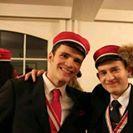-
Posts
36 -
Joined
-
Last visited
-
Days Won
2
Marc O'Callaghan last won the day on March 3 2017
Marc O'Callaghan had the most liked content!
About Marc O'Callaghan
- Birthday 05/12/1998
Profile Information
-
Gender
Male
-
Location
Switzerland
-
Occupation
Student
-
Favorite Composers
J.-S. Bach, W. A. Mozart, R. Wagner, A. Honegger, B. Britten, H. Purcell, C. Monteverdi
-
Notation Software/Sequencers
Finale v25
-
Instruments Played
Guitar, Piano, Tin Whistle, Flute, Singing
Recent Profile Visitors
Marc O'Callaghan's Achievements
-
Marc O'Callaghan changed their profile photo
-
Indeed, their accent is good and I wasn't criticising it! I recognise it is not an easy piece as far as breathing goes, especially, as you say, for a small ensemble. Thank you for the info about silent e's, I was only commenting because I never saw a single score where they weren't marked (and French is my mother tongue and I sing in a native French choir).
- 9 replies
-
- womens choir
- moon
-
(and 1 more)
Tagged with:
-
There is a lot of good material here, and I dig the idea of the aleatoric parts, even though everything sounds rather disastrous on MIDI and doesn't do justice to what it could ultimately sound like. Do be careful with the choir parts, though - they aren't easy to sing. I don't know what sort of choir is going to sing your piece, but in general, try to avoid major 7ths, especially at the top of a voice range (thinking of Tenors mm. 57ff.). They'll almost never be completely precise, and if Tenors have to hit a high F# it'll be too low for sure. Finding the notes in m. 45 will be hard. The D is easy, but the Eb and Gb are hard to take from a G natural. If the choir hasn't got a 100% trained ear, you're bound to have a fraction of a second where a few voices will be floating around trying to find their note - and that's a risk I personally wouldn't take. You could give them a grace note that's easy to find and move on to the note you want immediately afterwards, that would already make it easier for them. Another note: look out for typos in your aleatoric parts, judges won't forgive you. Correct Dues --> Deus on p. 2, spritus --> spiritus on p. 3, saunctum --> sanctum on p. 7. Good luck!
-
I like the folk touch to the melody - like Ken said, something of Shenandoah comes to mind. Very sweet melody and harmonics! The only setback I can find is that you don't separate the silent e's. In spoken French, it's been ages since anybody says them anymore, but in music they have to be counted as a separate syllable, otherwise the text doesn't sound articulate, especially in pieces like this one where the polyphony superposes different syllables. Besides, if the singers aren't native, not separating the silent e's will only show their accent more (thinking of calm(e) which sounds more like English calm than cal-me would).
- 9 replies
-
- womens choir
- moon
-
(and 1 more)
Tagged with:
-

Brian Boru - Overture
Marc O'Callaghan replied to Marc O'Callaghan's topic in Orchestral and Large Ensemble
Hi @Adrian Quince, again many thanks for your comments :) I see what you mean about the trumpets, it seems a pity to waste the harmonic potential there. What do you think of this version? I also removed the horn doubling of the tuba, as you suggested. This really seems to be taking shape now, for the greatest part thanks to you! -
It seems to me like a bit of a lousy argument on the part of the publishing house... Dissonances are never very easy to deal with in a choir, and you have a lot here - the rhythms aren't very complex, that's true, but the harmonics are, and I don't see how a college choir would find it so easy - not all college singers are virtuosos.
-
Hi, this is really good stuff, congratulations! I love the daring use of dissonances, it's very pleasing to listen to. Really well done, especially for your first composition! A couple of thoughts on making the piece high-school-friendly: 1. The first note of the Tenors is not easy to catch - nowhere near impossible of course, but for a high school choir perhaps it's a bit hard. I know that in mine, the lads wouldn't be at ease. 2. M. 26: don't combine Basses on low F# and Sopranos on high G, especially in the ff, because the Sopranos will be so loud they'll cover the rest. Besides, high-school-aged Basses are seldom true Basses, rather Bass-Baritones, and they won't be able to produce a proper low F# ff: either they'll lose power or the note will be unstable and sound bad. 3. Be careful, you give the voices some hard jumps at times, avoid major 7ths, especially in the extremes of the range, they might sound sloppy. (Basses 2, mm. 36-7) And also a few general thoughts on the piece: 4. This is a matter of taste, but I'm not a fan of two 2nds in the same chord, you have a lot of those (and often unresolved, or bringing onto another dissonance) and it seems like there's too much happening at the same time. For instance "(a-)lone", m. 10, "streams" m. 14, "temple" m. 16, "the" m. 22. My ear would prefer if you resolved one of the two seconds in the chord at some point. Major 7ths are dangerous in a choir the members of which may not have a trained ear, because they'll ultimately tend to drift towards a resolution. Besides, complex chords are more difficult to sing. E.g. if the choir has A - C# - D, those who sing D can listen to the C# and "keep away" from it, whereas if you have A - C# - D - E, the D-part is not sure where to go, wobbles around a few quarter-tones and, from my experience, takes a long time to be fixed. 5. I'm not one to criticise parallel fifths and octaves per se, because they don't disturb me, but I would recommend avoiding having both parallel fifths and octaves in the same sentence, as in mm. 22-5 where B1 and B2 are in parallel fifths and B2 is doubled on the octave by T2 as well. It's not that it damages the music, but it seems a pity to me because you are wasting opportunities for interesting harmonics.
-

Brian Boru - Overture
Marc O'Callaghan replied to Marc O'Callaghan's topic in Orchestral and Large Ensemble
Here is the latest version. As you suggested, @Adrian Quince, I gave each instrument his own staff, made a couple of changes and condensed it back into a standard form. I also added a title page, which explicitly gives the required numbers. Enjoy! -
I don't have much to add to what's already been said. The music is emotional and well written. You set the mood very well and now that you've explained your wish to emphasise "o vos omnes" I understand where you're going. Just be careful with the nuances you require, not all notes within a singer's range can be sung in all nuances. For instance, in m. 54, you can't ask the Basses to sing a top D piano, they'll most likely switch in head voice, which if they're amateurs they don't master, and it will sound bad. Although this is a crescendo part, so it will most probably sound ok. Similarly, and probably more importantly, don't have them sing a low F fortissimo, because either they won't be able to produce it well and it won't come through (if they're mainly Baritones straining to get the note) or it'll sound like a belch more than like a proper note. In both cases they'll be drowned in the 1st Sopranos who are singing their high Ab at the same time - avoid combining voices in their opposite extremes, because the high part will always cover the low one especially in a choir, where by default, lower notes will be taken p (and it's almost impossible otherwise) and high notes will be taken f because it's easier.
-
Hello, if this is really one of your first orchestral works you have a lot of potential. There's a lot of good stuff going on here. Demo 55 I liked 55 a lot, am I right in saying Hans Zimmer is an inspiration? A few motives sound very much like his style. Just a note on the score, the correct spelling is spiccato, not spicatto and détaché, not detache, and I'm not sure I understand what you mean when you use one tremolo bar on a sixteenth-note figure: is this just me who doesn't know String techniques well enough (that's quite possible), or did you come up with that notation? I have doubts about it , because as I understand it, it encourages to detach the notes even more, and I'm not sure that's the effect you want, because it doesn't come through in the audio and the legato we hear is exactly what gives the string parts a very flowing sound. Besides, be careful with spiccato at that tempo, I'm not sure of what the effect will be - quick tempos will cause the bow to bounce more and ultimately you might end up with a sort of sautillé that would sound too comical for this piece. During your whole B section, 2nd Violins are above 1st Violins all the time. Sound-wise this is irrelevant, but I would recommend switching the two parts - might as well keep the score simple and consistent. This applies to m. 25 as well, bringing 2nd Violins to top G (and at that speed particularly) is a bit harsh and would not be necessary since the 1st Violins aren't playing anything. Demo 60 Like Ken said, a lot of energy here. Good stuff too. However, I'm surprised by the difference in mood between this piece and the previous one - 55 is very serious and epic and hollywoodian, whereas listening to 60 the first thing that came to my mind was Tom chasing Jerry (absolutely not meant dismissively, I'm just pointing out an interesting difference). So if you did indeed mean this piece to be humorous, you did a very good job and I don't really have anything else to say, but if you didn't specifically, my advice is to be careful with staccato Tuba and Woodwinds, especially in their high range - this will immediately make anything sound comical and, if exaggerated, ridiculous. In section G I liked the contrast between the seriously menacing bass line and the quick rhythms above. All in all, two very enjoyable pieces!
-

Brian Boru - Overture
Marc O'Callaghan replied to Marc O'Callaghan's topic in Orchestral and Large Ensemble
@LostSamurai Thank you very much for your review! Happy I managed to get the emotions I felt through to you. @Adrian Quince Again, thank you very much for your help, I really am very grateful for all those informations and ideas you are giving me. I knew brass didn't like high notes and they probably would not like me for writing that, but I hadn't thought about the tuning question. I suppose I'll bring them down most of the time and if I really need high notes will double them in octaves. Originally, I planned for two Tenor Trombones and two Trumpets, but then assumed it must have been a bad idea when you talked about 3 of each . As you now know, I have no orchestral experience and will, for the time being, have to take your word for it that there's no need for 3, but I'm concerned about the horns - melodically I never use more than 2 voices after that, so finally yes, why not only use 2 instead of 4, but do you think they would still come through enough? I understand your view on the Volga Boatmen, it's true that it sounds very Russian and almost too menacing for what I wanted it to be, just like you said . I think I'll remove those bars, with a few days hindsight they are indeed more of a hindrance to the Laddie than anything else. I'll try to think all this through and reorganise the score like you suggested - and really, with all the helpful comments you have made, don't be sorry for taking time to answer! -

Brian Boru Cantata - in progress
Marc O'Callaghan replied to Marc O'Callaghan's topic in Choral, Vocal
@Adrian Quince I definitely see what you mean, and I am going to look for another solution. However, I tend to be more of an Independantist myself, but my argument to use Zadok the Priest is that it has been used widely in coronations and royal weddings outside of England too. Besides, the actual text of the original piece never mentions England itself, all the references are biblical, which I find pertinent insofar as Ireland was a very Christian country. -

Brian Boru Cantata - in progress
Marc O'Callaghan replied to Marc O'Callaghan's topic in Choral, Vocal
Well, it's certainly your right to find this piece useless and I'm quite aware of the fact my music isn't brilliant (reviewing amateur music is actually the whole point of YC, in case you didn't know), but at least be polite enough to explain why and what could be done about it. Judging by your other posts you're not a particularly courteous person anyway, so unless you actually have useful tips for me and the rest of us who don't seem to be capable of writing up to your standards (even though you haven't shown us your own abilities yet), I'm not holding you back. -
Anthony Johnson started following Marc O'Callaghan
-

Brian Boru - Overture
Marc O'Callaghan replied to Marc O'Callaghan's topic in Orchestral and Large Ensemble
@Adrian Quince I see what you mean about the martial mood not coming through. I've taken things the other way round and instead of trying to produce a fanfare-ish sound at the beginning I took up the tune of an Irish folk song, the well-known Irish Soldier Laddie (a handy song, because it can be sung by drunkards dancing on the tables just as well as enthusiastic soldiers or indeed very homesick ones), and basically I now rather picture the soldiers marching away singing with the drum egging them on. I hope this comes through? I also took up the opening notes of the Song of the Volga Boatmen, which is a motif that really expresses the unrelenting force of the tired army marching on. I also changed a few things in the rest of the piece, I hope it sounds better now. -

Brian Boru - Overture
Marc O'Callaghan replied to Marc O'Callaghan's topic in Orchestral and Large Ensemble
Many thanks to all three of you for your comments! @Monarcheon I realised there were quite a few involuntary dissonances in there, I believe I have corrected them now. I hope those "unjustified chord modulations" were also bettered in the process - to my ears it sounds more logical now than it did before, but that's only me and the composer is never the best judge (especially when he's not trained!). If you still think some modulations are inappropriate, could you give me an instance, so I can know what you mean exactly? The sudden transitions were meant to show how fast things will change later in the story (from peace to brutal war and back to peace), but I realise it's not very appealing to the listener and tried to soften them up. @maestrowick I know American orchestras use C Trumpets, but as far as I know European ones have kept Bb (as I'm Swiss and writing about an Irish character, I'm assuming the work would be played somewhere in Europe, if it ever was to be performed). I'm not so sure though, so I changed it anyways. @Adrian Quince Thank you dearly for that extensive review, I didn't expect as much! I understand your point on the voices being hard to follow if they all leap at the same time and tried to correct it, but I don't really find any major instances here. If there still are any, would you please point them out? As I said, I've been working so much on this piece these last weeks I probably don't notice things that would seem obvious if it was somebody else's work. The final 16th-note figure is not really meant to sound defined, rather a loud growl behind the orchestra to mark the (quite predictable) end, so I left it with the Bass Drum. Thanks for pointing out I'd left the Tam-Tam in the score, I don't use it anyway. I had trouble adjusting the brass parts to balance them better, as I don't really know those instruments - is the new solution, i.e. mostly the same but with divisi Trombones, an intelligent way to get around the problem? Especially the opening statement was troublesome - I see where you're going when you suggest a single melodic voice, but it seems to me like it would be a pity, there are a few harmonics I like in that part, even though it's far from perfect. I hope the new version is more appropriate. Thank you for the info about drum roll notation - the way I learned it (with the wavy line) goes back to Cecil Forsyth, i.e. in the twenties, so I guess it's a bit outdated now . Answering your question, @Adrian Quince, I intend the overture to introduce the story, as I mentioned above, showing the progression through war and peace and ending in a battle. A few themes I brought into the overture will appear later in the cantata, but that's not the main purpose - rather I intend it to set the ambiance/general feeling of the story. Anyway, as always, any comments on the new version are welcome! Cheers, Marc -
Marc O'Callaghan started following Brian Boru - Overture
-
Hello all, This is the overture to the Brian Boru cantata I posted the rest of (so far) on Choral & Vocal. As I realise posting 40-ish minutes of music in one go is rather off-putting, especially since I'm not very active on YC myself, let's take things progressively. Further informations on the subject of the cantata itself can be found in my other post, however I doubt you'll really need any as this is purely instrumental. Any kind of comments is welcome, as this is my first major orchestral work. Cheers, Marc






